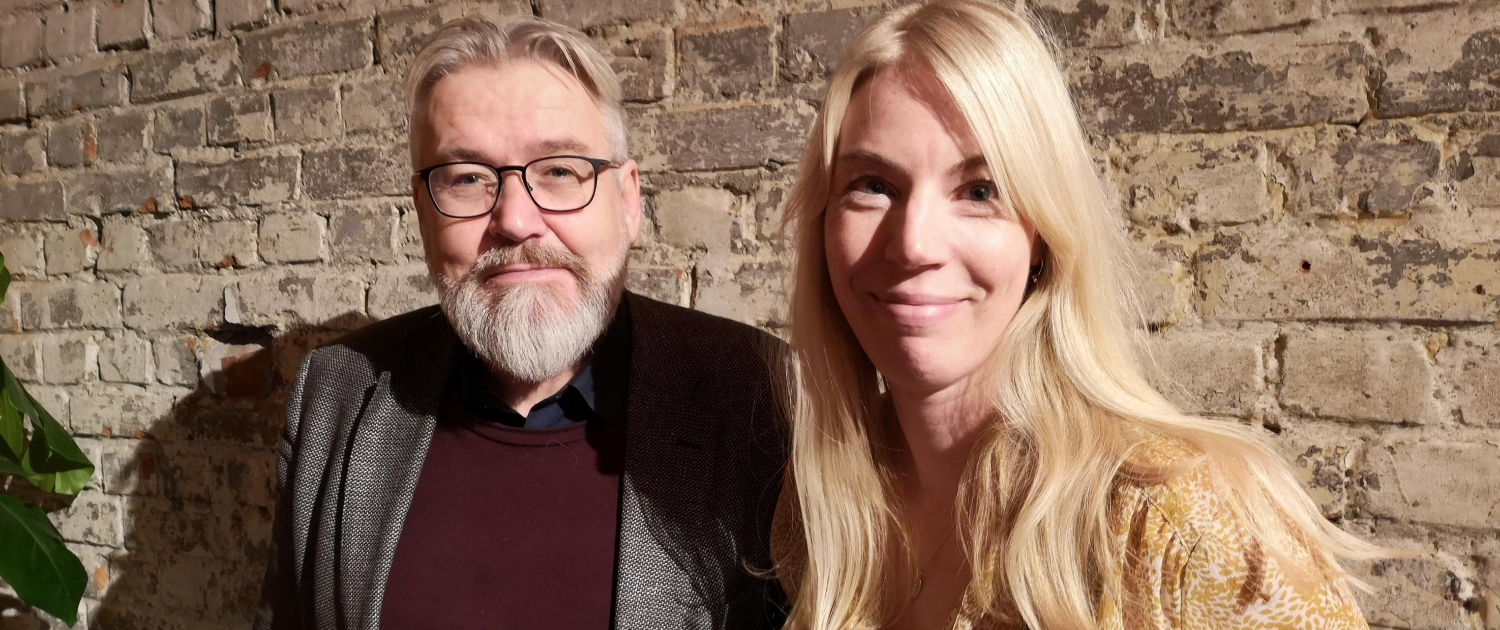100 episodes of cancer research & development

From a relatively modest podcast to packed live shows at Arendalsuka, Radium has in three years grown into a leading cancer podcast in Norway.
Radium is a weekly podcast about Norwegian cutting-edge cancer research and development, produced by the evergreen investment fund Radforsk. Radforsk has 15 companies in its portfolio, of which five are on the stock market and 10 are also members of Oslo Cancer Cluster. Elisabeth Kirkeng Andersen, Communications Manager, and Jónas Einarsson, CEO of Radforsk, bring guests on the show to discuss recent development in the oncology field and news from the portfolio companies.
“Three years ago, Elisabeth came to me and said ‘Now, we are going to do something new – we will make a podcast’. I replied ‘That’s great! But what is a podcast?’” Einarsson said.
Andersen then took the first steps and employed students from the media program at Ullern Upper Secondary School to help with sound production.
Interested investors
Andersen and Einarsson quickly noticed there is great interest in the podcast, especially from investors and shareholders. They want to stay updated about Norwegian cancer research, a relatively new but growing sector. They often send in questions, which Andersen and Einarsson ask the guests in the studio.
“We try to simplify things. It is easier to hear it explained by someone from a company, than to read a difficult press release,” Andersen said.
“I think the best episodes are when we get a good dialogue with the CEOs of the companies, especially when things get a little heated. I try to lure them out on the thin ice to make them tell us more,” Einarsson said.
The popular podcast format has exploded in recent years, giving people access to accessible conversations that they can listen to whenever they want.
“There is no strict direction. We say that we are just going to have a conversation and then we talk for an hour or more,“ Einarsson said. “We have a down-to-earth style, but Elisabeth will pull us back if the guests or I dive too deep into details.”
Affecting health policies
Radium has also had several events with live streaming. At Arendalsuka this year, the premises were fully packed with eager listeners at both of their live shows.
“At Arendal, we try to have podcasts with others in the cancer field and aim to be more political. We think it has worked very well, because we can reach out to even more people when we stream the event,” Elisabeth said.
“I think the podcast will interest people working in the health industry and health politics too,” Einarsson said. “For example, the health minister was a guest for an entire hour, talking about current challenges.”
Best of Norwegian research
Radium regularly invites famous names from the Norwegian research community too. Steinar Aamdal, a prominent researcher in cancer immunotherapies has been a guest. Another cancer expert, Håvard Danielsen, who works on the DoMore project at Oslo University Hospital, has also talked on the podcast.
Øyvind Bruland and Roy Larsen, the serial entrepreneurs who started Algeta, Nordic Nanovector and OncoInvent, also visited the show.
Soon, Radium will host Kristian Berg, the researcher behind PCI Biotech’s technology: photochemical internalisation technology.
“I believe people think it is very interesting to, through the podcast, meet the people who actually have researched and developed the treatments,” Einarsson said.
For the patients
Einarsson and Andersen have also noticed that cancer patients or their family members listen to the podcast to hear about what is happening in the field.
“It is important to communicate that we do this for the patients. An important driving force is that we wish to contribute to developing better treatments for patients,” said Andersen.
“Every time the survival rate increases, it means one patient gets to live longer – and perhaps that is because of a treatment we have helped to develop,” said Einarsson. “To be a part of the journey with immunotherapy over the last 20 years, for an old doctor like me, is absolutely fantastic.”
Listen and download Radium:
Send in your ideas for guests and topics directly to Radium.
Episode 100 was recorded at Kulturhuset in Oslo, with several interesting guests, a friendly atmosphere and, delicious food and beverages. Stay tuned for upcoming live events via Radforsk’s Facebook page!



